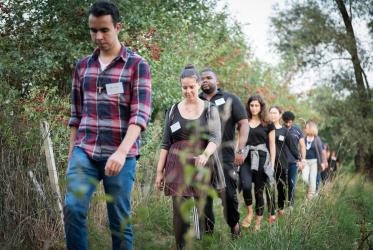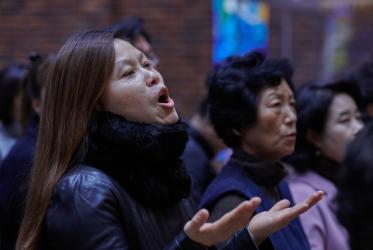The moral imperative to end extreme poverty and advance proposed Sustainable Development Goals (SDGs) was the focus of an event hosted by the World Council of Churches (WCC) on 24 September at the Church Center for the United Nations in New York City, United States.
The event brought to public attention the call to action, a joint statement titled Ending Extreme Poverty: A Moral and Spiritual Imperative – launched in April and signed by 39 leaders from major world religions and heads of global faith-based organizations. These organizations were as diverse as the WCC, ACT Alliance, American Jewish World Service, Baha’i International Community, Eco-Sikh, Islamic Relief Worldwide, Religions for Peace and World Vision International.
The joint statement indicates the need to “act, advocate, educate and collaborate [in order to] empower and uplift those living in poverty, so that they can become agents of their own transformation.”
The event in New York was co-sponsored by the WCC, the United Nations Inter-Agency Task Force on Religion Development, the World Bank and several other, multi-religious organizations.
The event mobilized a cross-section of faith-based and religious organizations to find tangible ways to realize sustainable development goals and the end of extreme poverty. The meeting strengthened collaboration between faith-based organizations, governments, the UN and the World Bank Group.
At the meeting, the Faith-based Action Framework to End Extreme Poverty was introduced to an audience of more than eighty representatives of faith-based organization. Participants further committed themselves to the Moral Imperative call and affirmed the Action Framework. An afternoon session brought together members of the entire community, including both multilateral and faith organizations, devoted to working together to end extreme poverty.
Multilateral representatives at the meeting included Thomas Gass, United Nations Assistant Secretary-General for Policy Coordination and Inter-Agency Affairs; Mahmoud Mohieldin, Corporate Secretary and President’s Special Envoy, World Bank Group; Luiz Loures, Assistant Secretary-General of the United Nations and Deputy Executive Director, UNAIDS; David Donoghue, Ambassador, Permanent Mission of Ireland to the United Nations; Azza Karam, senior advisor, Culture, United Nations Population Fund and coordinator, UN Inter-Agency Task Force on Religion and Development; and Adam Taylor, lead, Faith Initiative, World Bank Group.
Faith communities in attendance included Global ONE, Society of Jesus, Islamic Relief Worldwide, Baha’i International Community, World Vision, Organization of African Instituted Churches, International Network of Religious Leaders Living with or Personally Affected by HIV or AIDS (INERELA+), Church World Service, American Jewish World Service, Christian Aid, ACT Alliance, World Council of Churches, Caritas Internationalis, Global Interfaith WASH Alliance, World Evangelical Alliance and Religions for Peace International.
Dr Evelyn Parker, member of the WCC’s Commission of the Churches on International Affairs (CCIA) welcomed participants of the meeting, and emphasized the importance of coming together as faith leaders to address issues of extreme poverty and its root causes.
Rudelmar Bueno de Faria, WCC representative to the UN, celebrated the affirmation of the Action Framework to End Extreme Poverty: “It is an inspirational document, which allows religious leaders and faith-based organizations to come together at regional and national levels to work collaboratively on concrete actions to address issues of extreme poverty and inequalities. It is an opportunity to engage faith communities in the implementation and monitoring of the SDGs.”
The successful gathering of faith-based and multilateral organizations this Thursday confirmed a collaborative effort to realize the SDGs and to put an end to extreme poverty.
WCC joins religious and faith-based organization leaders in issuing call and commitment to end extreme poverty by 2030 (WCC news release of 9 April 2015)
Statement: Ending Extreme Poverty: A Moral and Spiritual Imperative





